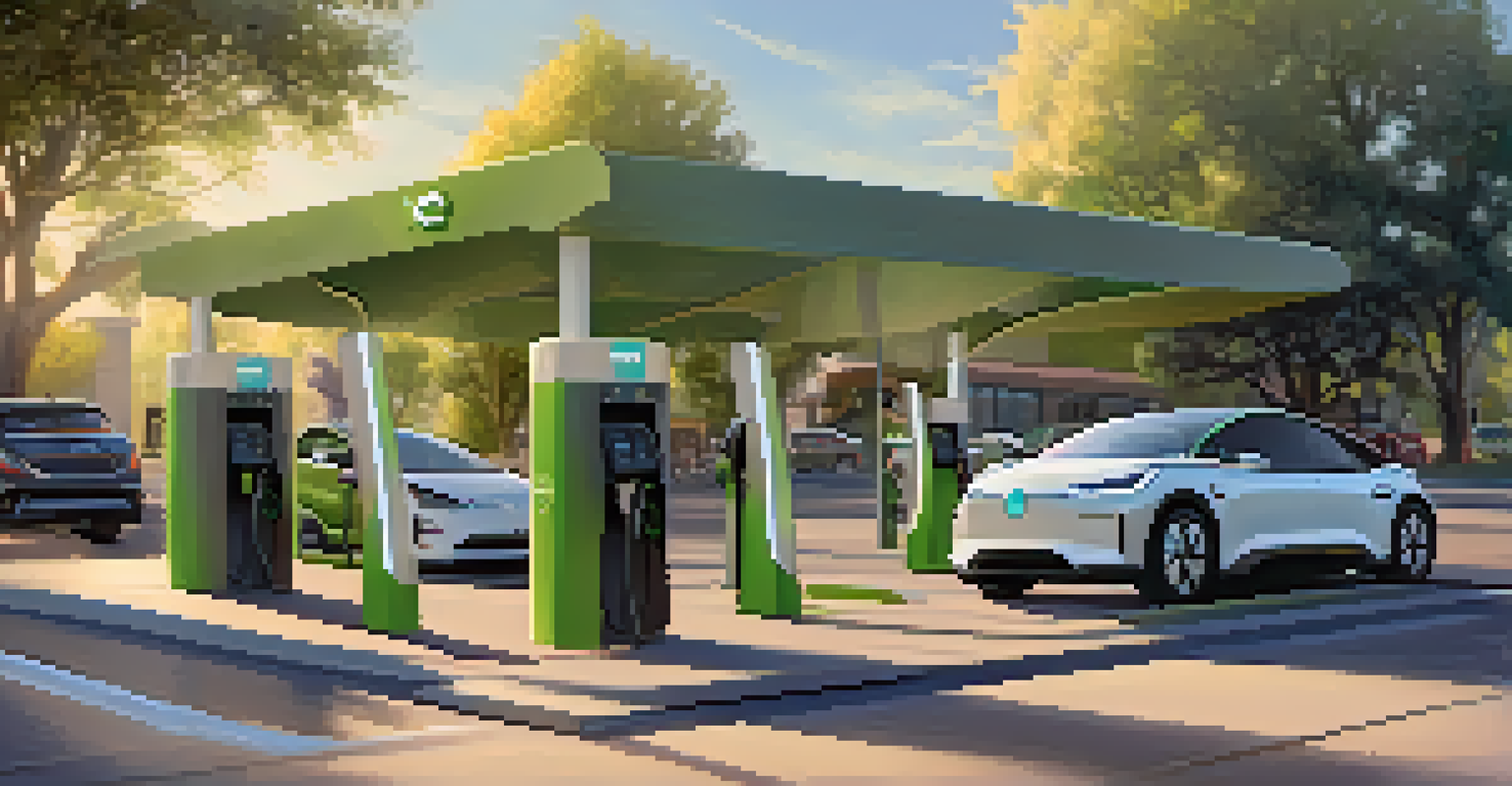Boulder's Climate Action Plan: A Roadmap for the Future

Introduction to Boulder's Climate Action Plan
Boulder's Climate Action Plan (CAP) is an ambitious initiative aimed at addressing climate change while enhancing community resilience. This forward-thinking roadmap outlines specific goals and strategies to reduce greenhouse gas emissions and promote sustainability across the city. It serves as a guide for residents, businesses, and local governments to work together toward a common vision for a greener future.
The greatest threat to our planet is the belief that someone else will save it.
One of the most exciting aspects of the CAP is its focus on community engagement. Boulder encourages residents to participate in discussions and initiatives, making the plan not just a policy document but a living, breathing effort that reflects the values of its citizens. This inclusive approach fosters a sense of ownership and responsibility among community members, ensuring that everyone has a stake in the future of their environment.
In this article, we will explore the key components of Boulder's Climate Action Plan, the strategies it encompasses, and how these efforts can inspire other communities. Together, we can learn how a city can lead the way in combating climate change and creating a sustainable future for all.
Understanding the Climate Goals of Boulder
Boulder's Climate Action Plan sets ambitious targets, aiming for an 80% reduction in greenhouse gas emissions by 2030. This goal is not merely aspirational; it is supported by actionable strategies designed to transition the city toward renewable energy sources and enhance energy efficiency. For example, the plan focuses on retrofitting buildings and investing in solar energy, paving the way for a cleaner, more sustainable energy landscape.

Additionally, the CAP emphasizes the importance of transportation in reducing emissions. By promoting public transit, cycling, and walking, Boulder aims to decrease reliance on fossil fuel-powered vehicles. This not only contributes to lower emissions but also enhances the quality of life for residents by creating a more walkable and bike-friendly community.
Ambitious Climate Goals for Boulder
Boulder's Climate Action Plan aims for an 80% reduction in greenhouse gas emissions by 2030 through actionable strategies like renewable energy and improved transportation.
Ultimately, Boulder's climate goals are not just about numbers; they represent a commitment to a healthier, more sustainable community for future generations. The city's proactive stance serves as a model for others, illustrating that ambitious targets can lead to significant positive change.
Strategies for Achieving Sustainability
To meet its climate goals, Boulder has laid out a variety of strategies that touch on different aspects of community life. These include investing in renewable energy, enhancing public transportation options, and implementing energy efficiency programs. By diversifying its approaches, Boulder ensures that every resident has the opportunity to contribute to sustainability efforts, regardless of their personal circumstances.
We do not inherit the earth from our ancestors, we borrow it from our children.
One standout strategy is the focus on building retrofits. By incentivizing homeowners and businesses to upgrade their energy systems, Boulder aims to create a more energy-efficient environment. This not only lowers utility bills for residents but also contributes to the overall reduction of greenhouse gas emissions in the community.
Moreover, Boulder's CAP also addresses waste reduction and management, recognizing that waste contributes significantly to emissions. By promoting recycling and composting initiatives, the city encourages a culture of sustainability that extends beyond energy use. These multifaceted strategies illustrate that achieving sustainability requires a comprehensive approach that touches every facet of daily life.
Community Engagement and Education
A crucial element of Boulder's Climate Action Plan is its emphasis on community engagement and education. The city recognizes that for the plan to succeed, residents must be informed and actively participating in sustainability initiatives. This has led to numerous workshops, informational sessions, and community events aimed at educating citizens about climate change and their role in combating it.
For instance, Boulder has launched programs that empower residents to make energy-efficient choices in their homes. By providing resources and guidance, the city helps individuals understand how small changes can collectively lead to significant impacts on emissions reduction. This approach not only informs but also inspires action, making sustainability a shared responsibility.
Community Engagement is Key
The plan emphasizes community involvement and education, encouraging residents to actively participate in sustainability initiatives and make informed choices.
Additionally, partnerships with local organizations and schools play a vital role in spreading awareness. By integrating climate education into curriculums and community programs, Boulder is fostering a generation that values sustainability and understands its importance. This long-term investment in education ensures that climate action remains a priority within the community.
Innovative Technologies Supporting the Plan
Boulder's Climate Action Plan is bolstered by innovative technologies that enhance its sustainability efforts. Smart grid technology, for example, allows for more efficient energy distribution and better management of renewable energy sources. This not only optimizes energy use but also helps to integrate more solar and wind power into the city's energy mix.
Another technological advancement is the use of electric vehicles (EVs). Boulder is investing in EV charging infrastructure, making it easier for residents to transition from gas-powered cars to electric alternatives. This shift not only reduces emissions but also aligns with the city's broader goals of promoting clean transportation.
Furthermore, Boulder's focus on data collection and analysis enables the city to track progress and make informed decisions about future initiatives. By leveraging technology, Boulder is not just reacting to climate change but proactively working to mitigate its impact. This forward-thinking approach sets a precedent for other cities aiming to implement similar plans.
Collaboration with Local Businesses
Boulder's Climate Action Plan recognizes the pivotal role that local businesses play in achieving sustainability goals. By collaborating with companies, the city fosters an environment where businesses can contribute to climate action while also benefiting from it. Initiatives like green business certifications encourage organizations to adopt environmentally friendly practices, creating a win-win scenario.
For instance, local restaurants and shops are encouraged to reduce waste through recycling and composting programs. Many businesses have embraced these initiatives, not only to comply with regulations but also to appeal to environmentally conscious consumers. This shift can enhance their brand image and customer loyalty, demonstrating that sustainability can be good for business.
Innovative Technologies Drive Change
Boulder leverages advanced technologies, such as smart grids and electric vehicle infrastructure, to enhance its sustainability efforts and effectively manage energy resources.
Moreover, Boulder actively seeks partnerships with businesses to innovate and implement sustainable practices. By providing resources and support, the city helps businesses make the transition to greener operations. This collaborative approach amplifies the impact of the Climate Action Plan, proving that community-wide efforts can lead to significant change.
Looking Ahead: The Future of Boulder's Climate Efforts
As Boulder's Climate Action Plan unfolds, the city is poised to make substantial progress toward its sustainability goals. With a strong foundation built on community engagement, innovative strategies, and collaborative efforts, Boulder is paving the way for a greener future. The ongoing evaluation of the plan ensures that it remains adaptable and responsive to new challenges and opportunities.
Looking ahead, Boulder aims to enhance its climate resilience by incorporating strategies that address the impacts of climate change, such as extreme weather events. By preparing for these challenges, the city can better protect its residents and infrastructure while continuing to work towards its emissions reduction targets.

Ultimately, Boulder's Climate Action Plan serves as a beacon of hope and inspiration for other communities. By demonstrating the power of collective action and innovative thinking, Boulder is not only tackling climate change but also fostering a culture of sustainability that can inspire cities everywhere to follow suit.